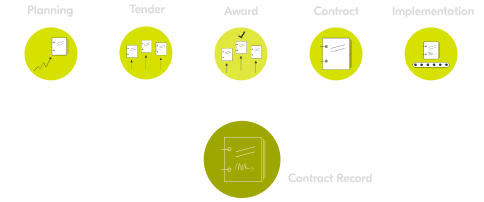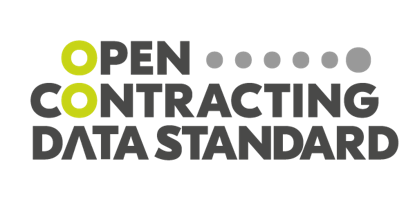The Open Contracting Data Standard
The Open Contracting Data Standard (OCDS), is a free, non-proprietary open data standard for public contracting, implemented by over 50 governments around the world.
It is the only international open standard for the publication of information related to the planning, procurement, and implementation of public contracts and has been endorsed by the G20, the G7 and major international organizations.
The OCDS describes how to publish data and documents at all stages of the contracting process. It was created to support organizations to increase contracting transparency and enable deeper analysis of contracting data by a wide range of users.
The OCDS provides:
- A set of recommended data fields and documents to publish;
- A common structured data model;
- Guidance and tools to support implementation and data use;
- Profiles for Public Private Partnerships, Infrastructure Projects, the European Union, and the World Trade Organization’s Agreement on Government Procurement;
- Toolkits such as the Open Contracting for Infrastructure Data Standard (OC4IDS) to connect contracts to project-level information and publish standardized data on infrastructure projects;
- An extension mechanism to add additional key information to your OCDS data; and
- A free data support team.
The Open Contracting Data Standard model

The Data Standard describes a way to model and publish data along the whole public contracting process. It is not an e-procurement solution or information management system. The OCDS can, however, be used to inform e-procurement (e-GP) system database design and the information contained in such systems can be published according to the standard and used for visualization, monitoring, and analysis. As the information is standardized, it is much easier to adapt and reuse tools from others.
“With the Open Contracting Data Standard it was like asking me to dig an Olympic pool and giving me an excavator instead of a teaspoon.”
We noticed the added value of making our data more publicly available. We want people to use our data, because it is more accurate, validated data.
“Our databases were a black box. We needed to create proper data governance to improve our data quality.”
“With the Open Contracting Data Standard it was like asking me to dig an Olympic pool and giving me an excavator instead of a teaspoon.”
We noticed the added value of making our data more publicly available. We want people to use our data, because it is more accurate, validated data.
“Our databases were a black box. We needed to create proper data governance to improve our data quality.”
Uptake of the OCDS around the world
The Open Contracting Data Standard is an internationally accepted standard with a growing community of users. This means that approaches to monitoring and measuring improvements can be shared across jurisdictions.
Currently, the OCDS is being implemented by 50+ national and subnational governments all over the world. We maintain a list of links to OCDS publishers on our data registry.
The European Commission is aligning its publication with OCDS through improvements to its eForms (i.e. the standards used to publish information about public procurement under the EU Directives) and the work of its eProcurement Ontology Working Group. With respect to eForms, many of the changes that the EU recently adopted were inspired and informed by the OCDS, both directly and indirectly, whether in terms of modelling (example) or in terms of the more general increase in the use of codelists and identifiers. The European Commission is also promoting OCDS implementation by member states as part of contract registers. It has given Italy and Finland funding to do so through its Connecting Europe Funding Facility.
The G7 and G20 have both endorsed open contracting principles, they are embedded into the OECD’s Methodology for Assessing Procurement Systems. Open contracting is recommended as a transformational reform by the Open Government Partnership.
Finally, using the OCDS can save both time and money as a lot of the work in publishing and making procurement information accessible has been done for you. The OCDS is free to use and backed by a data support team.
In addition to a detailed technical documentation, the OCDS is also accompanied by tools for validation, tools for conversion between nested (JSON) and tabular (CSV) data formats, and guidance for API development.
There are many reusable tools developed by both the OCP and the wider community. To get the same usability for value for money and other analysis, much time and money would go into developing a localized data model that would not be comparable with data from other countries or compatible with international validation and visualization tools.
How can I participate in the governance of OCDS?
The Open Contracting Data Standard has an open and inclusive governance process that is free for all to participate. All discussion related to the OCDS takes place in the open in the standard’s repository.
We invite publishers and data users to participate in peer reviews as part of the upgrade governance process. For example, in the 1.1 upgrade, we had peer review participation from Australia, Canada, the EU, Mexico, Nigeria, Paraguay, the US, and the World Bank (in addition to the many who participated throughout the consultation and prioritization periods).
We are currently in the process of developing the next minor release of the Open Contracting Data Standard, OCDS 1.2. To get updates about the process, please subscribe to the standard-discuss mailing list.
Useful resources
We want to support you with useful resources at every step of your open contracting journey.
Why implement the Open Contracting Data Standard
Contracting data published in an OCDS format is easier to share, compare and analyze. It allows publishers to adapt and reuse existing visualization and analysis tools, reducing costs and promoting innovation. The OCDS provides guidance on what to publish and how to publish the most important details about public contracting as identified by practitioners, researchers and other stakeholders.
The OCDS was crafted for four specific user needs, underpinned by a field-by-field analysis of how the data can be used to support those needs. They are:
- Delivering better value for money, saving government money and time;
- Building a fairer business environment and a level playing field for suppliers; and
- Improving public integrity by deterring fraud and corruption; and
- Tracking and improving service delivery.
Embedded into wider reforms, governments can use open contracting to secure better value for money for goods, works, and services and to build the trust of the private sector, civil society and citizens.
Joined up contracting data
| Planning | Tender | Award | Contract | Implementation |
| Including: | Including: | Including: | Including: | Including: |
| Budgets Project plans Procurement plans Market studies Public hearing info |
Tender notices Specifications Line items Values Important dates |
Details of award Bidder information Awarded suppliers Values |
Final details Signed contract Amendments Values |
Payments Progress updates Location Amendments Completion or termination info |
| Enabling: | Enabling: | Enabling: | Enabling: | Enabling: |
| Strategic planning Market research Setting priorities Access to market |
Competitive tendering Cross-border procurement Red flag analysis Transparent feedback mechanisms |
Efficient supplier management Efficient complaints mechanism Links to beneficial ownership data Red flag analysis Trade / cross border analysis |
Cost analysis Understanding what government buys Trade / cross border procurement analysis |
Results based contracting Implementation monitoring Transparent contract management Red flag analysis |
Everything joined through a unique open contracting identifier (OCID)
